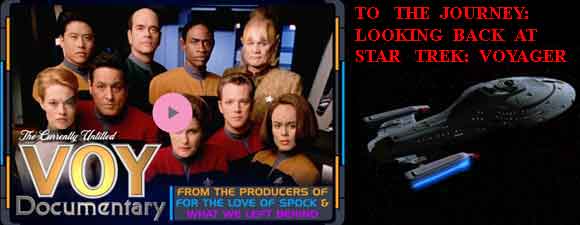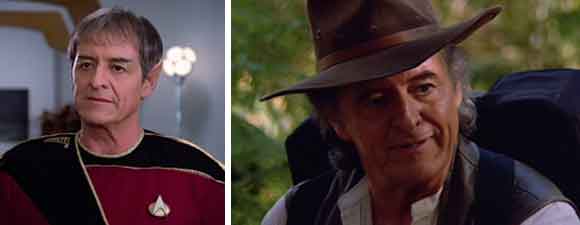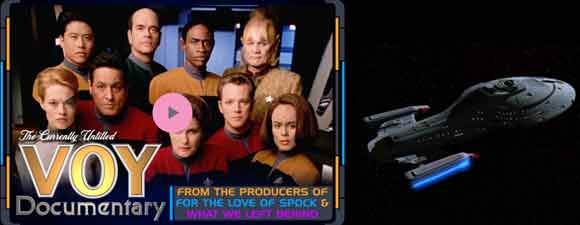Retro Review: Innocence
6 min read
innocencebanner
While Janeway greets an alien race, Tuvok’s shuttle crashes on one of their moons, where he meets imperiled children.
Plot Summary: As Janeway and Chakotay open negotiations with the reclusive, reserved Drayans, Tuvok’s shuttle crashes on one of their moons, killing Ensign Bennet. When he ventures out to make repairs, Tuvok discovers three children who claim that their parents died in a crash. Because he offers to take care of them, they reluctantly explain that they have been left on the moon to be killed by a cave-dwelling creature, the Morrok. The children distract Tuvok from his repair efforts, but his concern for their welfare leads him to hide them from search parties when they express their terror of being sacrificed. The Drayans are at first friendly to Janeway, though concerned at the pride Voyager takes in its technology and power, making the aliens reluctant to negotiate for the polyferranide that Voyager needs. When First Prelate Alcia discovers that Tuvok’s shuttle has landed on their sacred moon, she demands that Voyager leave immediately and orders her search parties to find Tuvok. Though the Vulcan is able to lull the children to sleep, two of them disappear in the night. When he investigates the cave where the remaining child claims the Morrok lives, he finds clothing that belongs to the missing children and at least one other. Returning to the girl hiding in the shuttle, he promises to help her leave the planet and attempts to launch his shuttle. As Janeway and Paris take another shuttle to try to negotiate with the Drayans, Tuvok’s shuttle is shot down. Alcia insists that Janeway take Tuvok and depart, but Tuvok will not leave without the little girl. Alcia is then forced to explain that her species ages in reverse to humans, and the “children” are very old Drayans at the end of long lives. Janeway apologizes for interfering and Tuvok is permitted to serve as a death guide for the remaining “little girl” – whom he reminds of her grandson.
Analysis: Backward-aging plots work well enough in fantasy, like legends where Merlin keeps getting younger, because nobody needs to explain the metabolic processes that cause it to happen and nobody asks how the backward-aging people figure out that everyone else in the universe isn’t like them. But it’s a silly enough gimmick when used in the animated Star Trek episode “The Counter-Clock Incident”…and it’s pretty ridiculous, not to mention predictable, in “Innocence” despite the earnest performances. I suppose that for some viewers, the charming conceit that innocence and joy accompany the memory loss and confusion of extreme age might seem like a happy avenue to explore. But without some sort of scientific explanation for how the bodies of the elderly become transformed to have the resilience and energy of youth, it seems more like the condescending fairy tale of the Morrok that’s told to elderly Drayans to explain their impending doom. As with the cultural practices surrounding death in Voyager‘s earlier episode “Emanations,” there are token attempts to be sensitive to beliefs not in line with scientific rationalism, but without some sort of scientific backing, it ends up sounding like mumbo-jumbo, and this time Chakotay doesn’t even get a chance to give lip service to the idea that people who consider themselves advanced should stay out of other people’s sacred spaces and graveyards. We get to hear Janeway wax rhapsodic about how much she loves first contact situations, yet she makes no attempt to learn why Tuvok’s situation is so distressing to the Drayans, nor does she give them any reason to believe she cares about what they might want in exchange for the polyferranide that Torres tells us Voyager urgently needs.
Any given episode can be forgiven for a weak plot or a cheap conclusion like “Innocence”; what’s a bigger problem is that the Voyager writing staff still seems to have no idea who Tuvok is, or, really, what a Vulcan is. I know it was a point of pride for several writers that they weren’t fans of the original series and therefore weren’t bound by what they saw as its cliches, but for continuity’s sake, they might have paid attention to the construction of the beloved species they carried over into a new generation. Tuvok doesn’t seem to have mastered his emotions, as one would expect of a Vulcan of his age with no reported mental problems before his recent mind meld with Suder. Rather, he seems to be highly emotional, clinging to Vulcan discipline as a means of repressing his feelings. Often he can’t turn off his condescension and annoyance, which we saw in original series Vulcans only when they were being thwarted deliberately. Not only Spock but his fully Vulcan father Sarek had sophisticated senses of humor and could express affection and gratitude. Tuvok, however, seems more akin to the obnoxious Vulcans of Deep Space Nine who scoffed at most of their fellow Federation members and sneered about how their logic would allow them to defeat humans even at their own games like baseball. It’s not the fault of Tim Russ, who gives a charming performance as a Vulcan in a difficult situation, having just witnessed the death of a crewmember and the probable loss of yet another shuttle, who then finds himself having to care for and protect a group of not-always-cooperative children who demand hugs and bedtime stories and force fields as well as the use of sensitive equipment as toys. The children are well cast too, and the scripting is well-paced. It’s just a crummy device propelling the story, and Tuvok seems very nearly erratic.
Despite the weaknesses in the writing of the first contact situation, Janeway does have some lovely moments in “Innocence.” I’m very fond of her explanation of the pleasures of being a captain after having been a science officer, when she was left on the sidelines during first contact situations, and her interactions with her first officer are full of all the warmth and intimacy that seem missing in her friendship with Tuvok, making Chakotay much more the Spock to Janeway’s Kirk than Tuvok will ever be. I can’t imagine Tuvok chuckling with Janeway over accidentally having propositioned an alien dignitary on a first contact mission, let alone all the smiles, the winks, the nods when things appear to be going well, then the typical expression of concern (interrupted by the typical calm dismissal on Janeway’s part) over the captain’s decision to go rushing into danger from which the first officer can’t protect her. I don’t think it would necessarily make Janeway a more feminist character if her style was more independent, like Picard’s; that’s the model we’ve had for centuries of the lone female leader, and it’s one we’ll get to see in later seasons when Janeway and Chakotay become estranged. Working and making decisions in isolation doesn’t always make Janeway look stronger and it certainly doesn’t make the show more interesting than watching this working relationship full of subtlety and private, intimate communication…again, so very like Kirk and Spock before them, and Roslin and Adama after them. In an episode that shows up all the ways in which communication is critical to avoid missteps and damaging relationships, the captain and first officer demonstrate how body language, private nods, shared humor, and subtle demonstrations of affection can speak just as loudly as a shouting Prelate.






